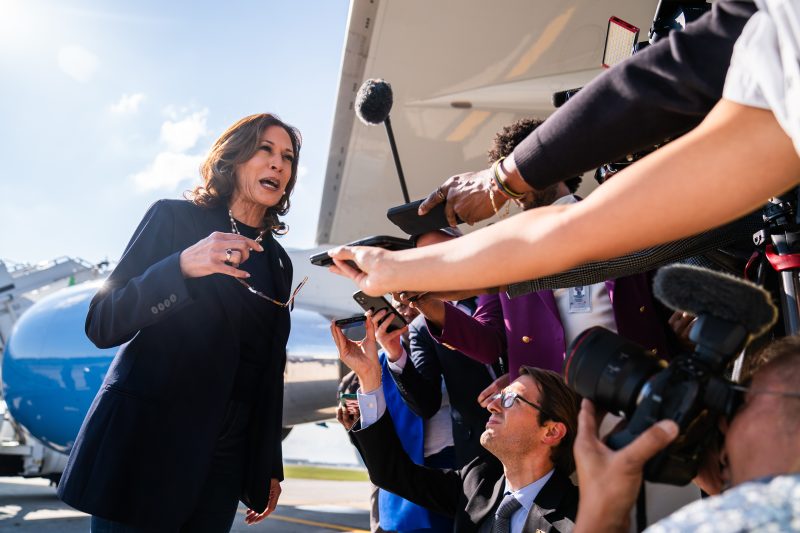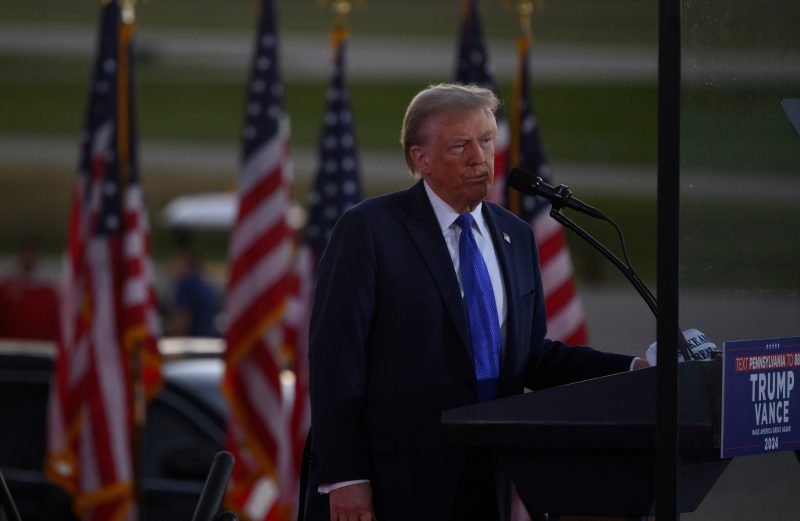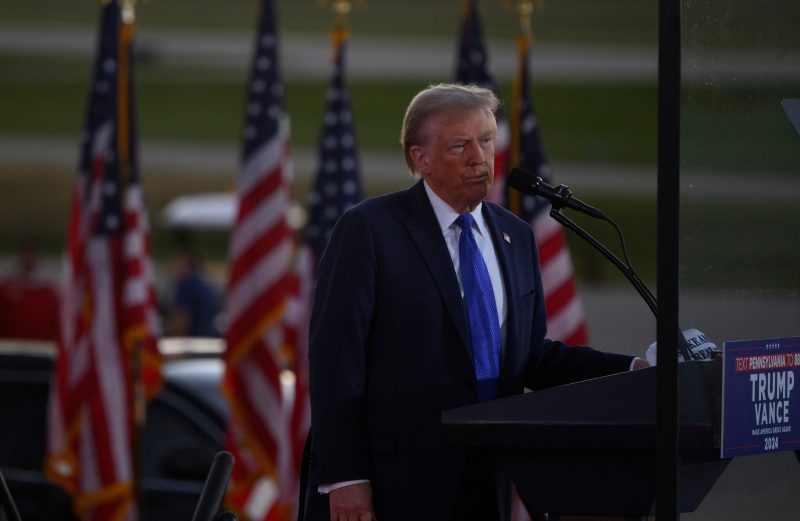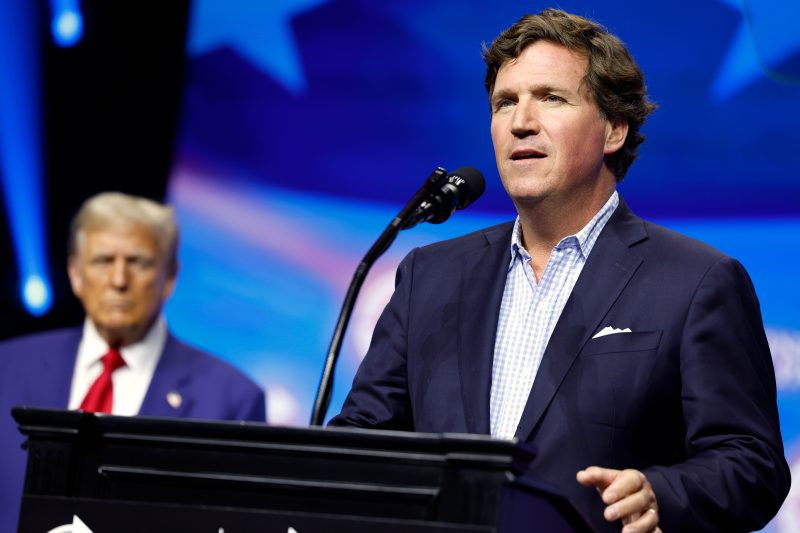
Harris meets with small team as she builds a campaign on the fly
As Vice President Kamala Harris ramps up a presidential campaign with almost unprecedented speed, she has been meeting quietly but regularly with a small group of close aides to go over everything from upcoming speeches to her convention address and debate preparation.
Sometimes the meetings are at Harris’s official residence in the Naval Observatory; other times, in deference to her intensifying travel schedule, they take place on the road, with some aides joining via Zoom.
The group, which started convening in June to prepare Harris for what was expected to be a vice-presidential debate, has now become the closest thing she has to a brain trust. The team includes Lorraine Voles and Sheila Nix, her chiefs of staff at the White House and campaign respectively. Also included are Karen Dunn, who helped Harris prepare for her 2020 debate, and Rohini Kosoglu, a longtime policy adviser.
Harris, supplied with briefing books by her aides, often spends time in the mornings or aboard Air Force Two reviewing materials assembled by these aides and others, taking notes and making edits.
This story is based on conversations with half a dozen Harris aides and allies, all of whom spoke on the condition of anonymity to discuss internal processes.
In one of the meetings, the vice president told aides she wanted to lean more heavily on her record as a prosecutor. That has now become a central part of her stump speech.
And when Republican nominee Donald Trump announced Thursday that he will take part in a Sept. 10 debate against Harris, it confirmed yet another high-stakes event this group will have to help Harris prepare for. Philippe Reines, a longtime aide to Hillary Clinton, has been lined up to play the part of Trump in debate practice.
The meetings are a reminder that Harris is assembling a campaign on the fly. Less than a month will have elapsed between President Joe Biden’s exit from the race on July 21, making Harris the likely nominee, and the kickoff of the Democratic National Convention on Aug. 19. That provides a tiny window for Harris to figure out how she wants to talk to voters and shape her message.
At an appearance Thursday in Michigan, Minnesota Gov. Tim Walz (D), Harris’s running mate, emphasized the compressed schedule, noting that only 89 days remained until the election.
“Think about this: 89 wake-ups,” Walz told a union audience. “I’ve been saying this. Eight-nine days — we can do anything for 89 days. Telling people, ‘Sleep when you’re dead.’ We’ve got work to do right now — right now. 89 days to make Kamala Harris the next president of the United States.”
The meetings with the inner circle of advisers are central to handling that expedited timetable. Two top communications aides, Brian Fallon and Kirsten Allen, take part. Minyon Moore, who will chair the convention; Sean Clegg, a senior adviser from Harris’s 2020 presidential campaign; former congressman Cedric L. Richmond (D-La.), who was a top Biden aide; and Adam Frankel, a former senior adviser to Harris in the White House, have also joined the sessions.
The group was formed under very different circumstances, before the political landscape was upended.
After Harris, then Biden’s running mate, accepted an invitation from CBS News in May to take part in a vice-presidential debate, she put together a team to prepare. But as the weeks dragged on without the Trump campaign agreeing to a date, the team’s meetings morphed into general strategy sessions on policy and messaging, with aides figuring this would help Harris prepare for a ramped-up campaign schedule.
Then, when Trump selected Sen. JD Vance (R-Ohio) as his running mate on July 15, the group accelerated its preparations, lining up Reines to play Vance in mock debates.
But six days after Vance was selected, Biden dropped out of the race and endorsed Harris.
After some back-and-forth, Trump has now agreed to join Harris on Sept. 10 in a presidential debate sponsored by ABC. The two campaigns remain in talks about scheduling a second debate with NBC, according to a person familiar with the conversations who spoke on the condition of anonymity to discuss confidential deliberations.
“Well, I’m glad that he finally agreed to a debate on Sept. 10,” Harris told reporters on Thursday. “I’m looking forward to it, and I hope he shows up.”
After the Democratic National Convention on Aug. 19-22, the same group will lead her efforts to prepare for the debates with Trump. Reines will play the part of Trump, reprising a role he had in 2016 for Clinton’s mock debates. Reines did not respond to a request for comment.
For now, the small team is mostly focused on Harris’s convention speech and major policy announcements to be made in coming weeks.
To that end, Harris has brought on additional policy aides, including Josh Hsu, who worked for Harris in the Senate and in her vice-presidential office. Hsu is advising Harris on legal and policy issues, including on criminal justice. Brian Nelson, a longtime Harris aide who worked at the Treasury Department, has also joined the campaign as a senior adviser for policy.
In recent days, Trump and his campaign have attacked Harris for not engaging with the media, accusing her of hiding and being afraid to take questions. Harris has not participated in a formal interview with a news outlet since Biden dropped out of the race, only answering brief questions from reporters while traveling.
“She can’t do an interview,” Trump said Thursday during an hour-long news conference at Mar-a-Lago. “She’s barely competent, and she can’t do an interview. I look forward to the debates, because I think we have to set the record straight.”
Harris said on Thursday she would grant an interview soon. “I’ve talked to my team,” she told reporters. “I want us to get an interview scheduled before the end of the month.”
Trump and Biden broke with decades of tradition this year by setting up debates directly with television networks, instead of relying on the Commission on Presidential Debates, an organization formed in 1987.
The two campaigns eventually agreed to two debates, one hosted by CNN in June and one hosted by ABC in September. In the first debate, Biden struggled to complete sentences and at times appeared confused, leading to a panic in the Democratic Party about his ability to defeat Trump. That eventually led Biden to exit the presidential race.
Biden’s stumbles in the debate may raise the stakes for Harris’s performance in the Sept. 10 showdown, as she seeks to show that she is a stronger candidate and can take on Trump more forcefully.
Brian Brokaw, who managed Harris’s campaigns for attorney general in California, said the vice president prepares for debates as she does other high-stakes public appearances, with deep dives into the subject matter and an obsession with details.
“When you are an attorney in a courtroom, words matter and details matter and if you get one fact wrong, it can cost you a verdict,” Brokaw said. “I think that’s in part why she is so hyper-focused on facts and getting the details right.”
But Brokaw also cautioned about raising expectations too high for Harris in her faceoff against Trump.
“He knows how to put on a show. He’s no amateur when it comes to this,” Brokaw said. “So it will be pretty interesting to see how their two very different styles line up.”
Michael Scherer contributed to this report.



